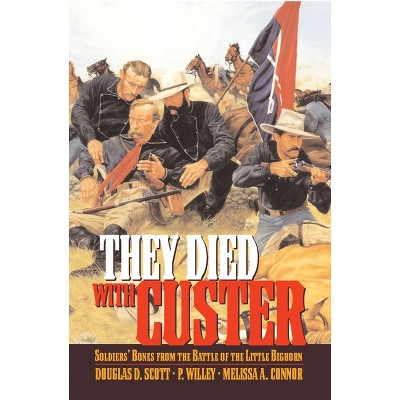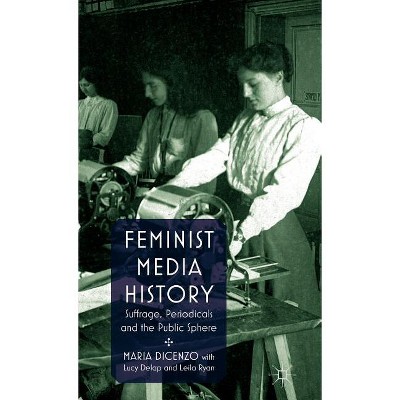Sponsored

Feminist Freikorps - by R M Douglas (Hardcover)
In Stock
Sponsored
About this item
Highlights
- The Women Police Service was unique as a feminist organization dedicated to the supervision and control of women themselves.
- About the Author: R. M. DOUGLAS is a Visiting Assistant Professor in the History Department at Colgate University.
- 200 Pages
- History, Europe
Description
About the Book
The Women Police Service was unique as a feminist organization dedicated to the supervision and control of women themselves. Formed in 1914 by middle-class veterans of the militant suffrage campaign in Britain, at odds throughout its history with both the authorities and mainstream feminist organizations and frequently operating in defiance of the law, the WPS combined authoritarianism and feminist activism to create its own distinctive concept of policing between the world wars.
As would-be members of a national women police force, the WPS hoped to shield women and children from the impact of a male-dominated criminal justice system while simultaneously enforcing upon them its own rigorous moral code. As ex-suffragettes whose disillusionment with the minimal progress achieved through the concession of the franchise accelerated in the 1920s and 1930s, members of the corps became increasingly alienated from the state they aspired to serve. These conflicting impulses culminated in the movement's final metamorphosis into a right-wing paramilitary force allied with Sir Oswald Mosley's British Union of Fascists. This first systematic study of the history of the WPS offers a unique perspective from which to examine sexual, political, and class ideologies that have received little attention in existing histories of modern British feminism.
Book Synopsis
The Women Police Service was unique as a feminist organization dedicated to the supervision and control of women themselves. Formed in 1914 by middle-class veterans of the militant suffrage campaign in Britain, at odds throughout its history with both the authorities and mainstream feminist organizations and frequently operating in defiance of the law, the WPS combined authoritarianism and feminist activism to create its own distinctive concept of policing between the world wars.
As would-be members of a national women police force, the WPS hoped to shield women and children from the impact of a male-dominated criminal justice system while simultaneously enforcing upon them its own rigorous moral code. As ex-suffragettes whose disillusionment with the minimal progress achieved through the concession of the franchise accelerated in the 1920s and 1930s, members of the corps became increasingly alienated from the state they aspired to serve. These conflicting impulses culminated in the movement's final metamorphosis into a right-wing paramilitary force allied with Sir Oswald Mosley's British Union of Fascists. This first systematic study of the history of the WPS offers a unique perspective from which to examine sexual, political, and class ideologies that have received little attention in existing histories of modern British feminism.Review Quotes
?A clearly written, interesting, well-documented, and enlightening book.?-Choice
?Douglas offers an intriguing interpretation of the links between early twentieth-century militant feminism and ultraconservative politics.?-Journal of Women's History
?Feminist Freikorps provides the first full account of those pioneering activists and organizers who confronted sexism and official resistance in their bid to put women in blue. Douglas's book is especially valuable as it clearly outlines, for the first time, the many organizations that sprang up on the eve of the Great War to harness this seemingly contradictory form of right-wing feminism...a thought-provoking and timely book. The lively, lucid, and often light tone of the narrative voice; the sensitive and often amusing biographical portraits of leading figures in the WPV; the thorough research and the skillful framing of the anecdotal evidence; and the generous complement of illustrations depicting the selfrepresentation and public reception of these renegade women in uniform, altogether make this not only a very valuable addition to the historiography but also a highly readable work.?-Canadian Journal of History
"A clearly written, interesting, well-documented, and enlightening book."-Choice
"Douglas offers an intriguing interpretation of the links between early twentieth-century militant feminism and ultraconservative politics."-Journal of Women's History
"Feminist Freikorps provides the first full account of those pioneering activists and organizers who confronted sexism and official resistance in their bid to put women in blue. Douglas's book is especially valuable as it clearly outlines, for the first time, the many organizations that sprang up on the eve of the Great War to harness this seemingly contradictory form of right-wing feminism...a thought-provoking and timely book. The lively, lucid, and often light tone of the narrative voice; the sensitive and often amusing biographical portraits of leading figures in the WPV; the thorough research and the skillful framing of the anecdotal evidence; and the generous complement of illustrations depicting the selfrepresentation and public reception of these renegade women in uniform, altogether make this not only a very valuable addition to the historiography but also a highly readable work."-Canadian Journal of History
About the Author
R. M. DOUGLAS is a Visiting Assistant Professor in the History Department at Colgate University.Shipping details
Return details
Frequently bought together


Trending Non-Fiction















